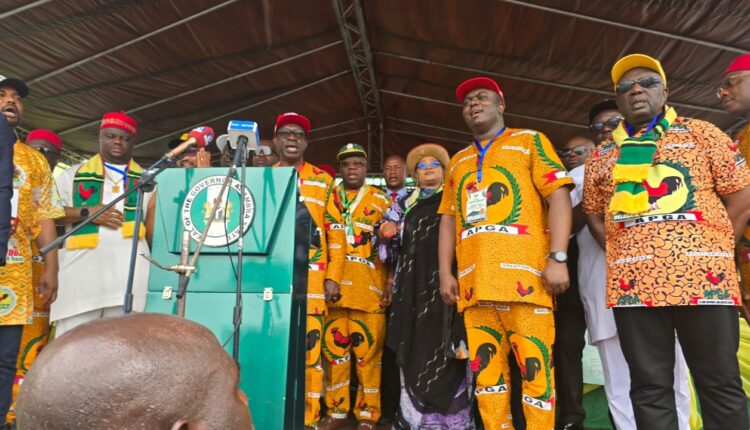
By Christian ABURIME
In a rare show of unity and political maturity by the All Progressives Grand Alliance, APGA, the entire political architecture of Anambra State converged with a single voice as all 21 Local Government Areas rallied behind Governor Charles Chukwuma Soludo, unanimously endorsing him as the sole candidate of the All Progressives Grand Alliance (APGA) for the forthcoming gubernatorial election.

The APGA convention, held in a charged but peaceful atmosphere, recorded 3,260 accredited delegates, out of which 3,175 cast their votes. Of those, 3,168 were valid, with only four invalid entries—each one of the valid votes going to Soludo, a clean sweep that underscored the confidence reposed in his leadership.
Chief Nwaegbo Uche, chairman of the electoral committee, officially declared Soludo returned as the party’s candidate, citing the unprecedented support across the board. The votes came from every part of the state—Aguata, Anambra East, Anambra West, Anaocha, Awka North, Awka South, Ayamelum, Dunukofia, Ekwusigo, Idemili North, Idemili South, Ihiala, Njikoka, Nnewi North, Nnewi South, Ogbaru, Onitsha North, Onitsha South, Orumba North, Orumba South, and Oyi—all affirming one voice, one vision, and one candidate.
The exercise was transparently conducted under the watchful eyes of officials of the Independent National Electoral Commission (INEC) from both the federal and state levels, who monitored the entire process from accreditation to collation, attesting to its orderliness and credibility.
Taking the stage amid thunderous applause, Governor Soludo was visibly humbled. In his acceptance speech, he paid homage to the founding spirit of APGA, describing it as the first registered progressive party in Nigeria, dating back to 2002. “Anambra is APGA, and APGA is Anambra,” he declared, a phrase that drew cheers from thousands gathered.
He spoke of his gratitude to Ndi Anambra, to the clergy, traditional rulers, the over sixty support groups, students, and countless individuals whose voluntary cash donations and constant encouragement had propelled the journey thus far. He acknowledged their testimonies, many describing his administration’s performance as “magical,” yet he reminded everyone that progress must remain a collective mission. “It is only together that Anambra can do better,” he said.
Governor Soludo outlined the core of his administration’s accomplishments—an ambitious but realistic blueprint built around five critical pillars. He cited the recruitment of over 8,115 teachers and public servants from across the country as part of his push to revamp human capital development. He highlighted gains in security and law enforcement, where criminal hideouts had been dismantled and peace gradually restored.
He spoke passionately about the economic transformation ongoing across the state, support for micro and small businesses, and the empowerment of artisans and traders. He reflected on the massive infrastructure development, especially road construction connecting rural and urban centres, and the drive to make Anambra cleaner through aggressive waste management and urban regeneration. Soludo also touched on his strides in digital governance, value system reforms, and efforts to deepen transparency and accountability in the public sector.
He reassured party members and the entire state that the journey was far from over. “We have only scratched the surface,” he said. “I will not let Ndi APGA and Ndi Anambra down. I cannot and will not take this trust for granted.” With conviction and clarity, he declared the goal of winning not just the election but every ward and polling unit, insisting that the vision is to build a future in which no one is left behind.
In an expected but strategic announcement, Soludo reaffirmed Dr. Onyekachukwu Ibezim as his running mate, stating that their partnership, which had produced visible results, would continue to drive the next chapter of transformation.
As the crowd erupted in renewed chants and applause, it became clear that this was not merely a political event—it was a people’s movement. From every ward and every village, the message rang loud and clear: Anambra has chosen continuity, vision, and leadership. The 21 LGAs had not just cast their votes—they had cast their future.


